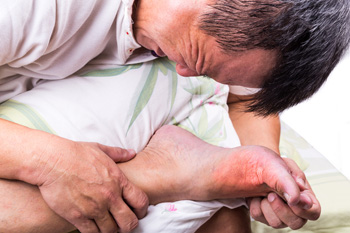
Nighttime gout flares often cause intense pain, swelling, and redness in the feet, and can severely disrupt sleep. Gout is a form of arthritis caused by a buildup of uric acid in the joints, and it frequently affects the big toe due to its susceptibility to stress and lower temperatures. Nighttime gout attacks may be linked to factors such as dehydration, reduced body temperature, and lower cortisol levels during sleep. These painful episodes can make it difficult for patients to find relief without medical help. A podiatrist can assess symptoms, confirm a diagnosis, and recommend strategies to reduce the frequency and severity of gout flares. These may include lifestyle modifications such as changes in diet, preventative techniques like weight loss, and treatments to alleviate pain and inflammation in the affected joints. Proper management not only helps to protect the health of your feet and ankles but also improves sleep patterns. If you have nighttime flare-ups of gout, it is suggested that you schedule an appointment with a podiatrist for guidance in managing this painful condition.
Gout is a painful condition that can be treated. If you are seeking treatment, contact Phyllis Weinstein, DPM from California. Our doctor will treat your foot and ankle needs.
What Is Gout?
Gout is a form of arthritis that is characterized by sudden, severe attacks of pain, redness, and tenderness in the joints. The condition usually affects the joint at the base of the big toe. A gout attack can occur at any random time, such as the middle of the night while you are asleep.
Symptoms
- Intense Joint Pain - Usually around the large joint of your big toe, and it most severe within the first four to twelve hours
- Lingering Discomfort - Joint discomfort may last from a few days to a few weeks
- Inflammation and Redness -Affected joints may become swollen, tender, warm and red
- Limited Range of Motion - May experience a decrease in joint mobility
Risk Factors
- Genetics - If family members have gout, you’re more likely to have it
- Medications - Diuretic medications can raise uric acid levels
- Gender/Age - Gout is more common in men until the age of 60. It is believed that estrogen protects women until that point
- Diet - Eating red meat and shellfish increases your risk
- Alcohol - Having more than two alcoholic drinks per day increases your risk
- Obesity - Obese people are at a higher risk for gout
Prior to visiting your podiatrist to receive treatment for gout, there are a few things you should do beforehand. If you have gout you should write down your symptoms--including when they started and how often you experience them, important medical information you may have, and any questions you may have. Writing down these three things will help your podiatrist in assessing your specific situation so that he or she may provide the best route of treatment for you.
If you have any questions, please feel free to contact our office located in Temple City, CA . We offer the newest diagnostic and treatment technologies for all your foot care needs.
